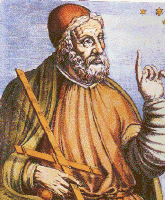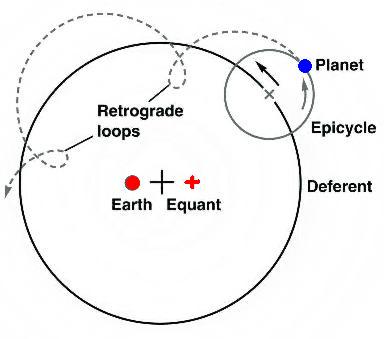The Ptolemaic Solar System Model
 Claudius Ptolemy lived in Alexandria, Egypt from approx.
87 - 150 A.D. He was an astronomer, mathematician and geographer.
He made observations from at least 127 A.D. to 141 A.D. His
model for the universe, and texts on astronomy, would be
THE standard for all western and middle-eastern
scientists for 1400 years!
Claudius Ptolemy lived in Alexandria, Egypt from approx.
87 - 150 A.D. He was an astronomer, mathematician and geographer.
He made observations from at least 127 A.D. to 141 A.D. His
model for the universe, and texts on astronomy, would be
THE standard for all western and middle-eastern
scientists for 1400 years!
Ptolemy proposed a model based on the Geocentric universe of Aristotle and assumed uniform circular motion of the heavens. Because of this, his model couldn't allow planets to slow down, stop, or change direction. He had to find another way of making the planets appear to change their direction of motion as seen from Earth, called retrograde motion (more on that here..).
 Ptolemy used an ingenious contrivance called the epicycle.
The planets moved around on these small circles, which they
themselves moved along a larger circular orbit called
the deferent. This allowed for varying planet
motions, as seen on Earth, while maintaining (nearly)
spherical motion and constant velocities. A
small adjustment was made
to move the Earth from the center of the deferent, defining
the equant, as the location of pure constant motion.
This was the Ptolemaic
Model.
Ptolemy used an ingenious contrivance called the epicycle.
The planets moved around on these small circles, which they
themselves moved along a larger circular orbit called
the deferent. This allowed for varying planet
motions, as seen on Earth, while maintaining (nearly)
spherical motion and constant velocities. A
small adjustment was made
to move the Earth from the center of the deferent, defining
the equant, as the location of pure constant motion.
This was the Ptolemaic
Model.
Ptolemy was a mathameticion first, and was most interested in getting his model to reproduce the motion of the planets with high accuracy. They did! --Given enough circles upon circles for the planets to move on. It even was useful in predicting their motions.. For a while. However, with time (century or two) the Ptolemaic Model began to show significant errors.
It was soon after Ptolemy died (destruction of the great Library at Alexandria and fall of the Roman Empire) that most of Europe and Western civilization fell into the dark ages, void of continued scientific pursuits. Luckily, knowledge gained during the previous enlightened centuries was picked up by, studied and appreciated by invading Islamic peoples (such as Ptolemy's Mathematical Collection, an encyclopedic summary of astronomical knowledge, Arab astronomers called 'al-Megiste', Almagest, "The Greatest"). This miraculously saved the brilliant astronomy, geography and mathematics developed in that era for an entire millennium, when Europe would finally re-awaken.